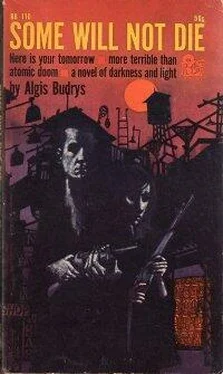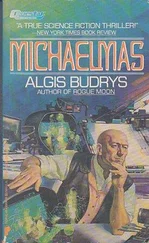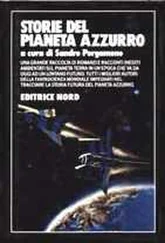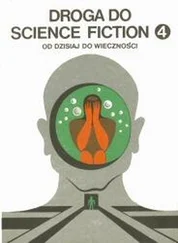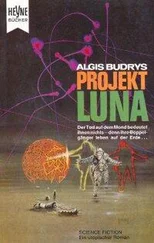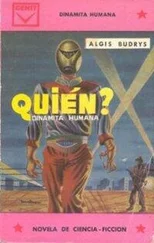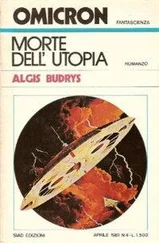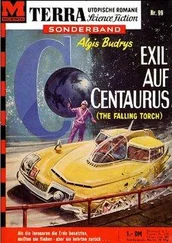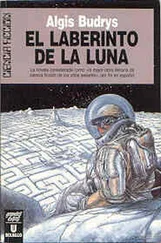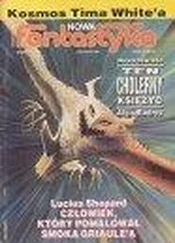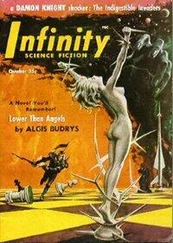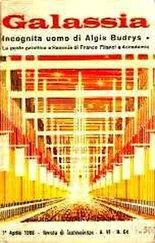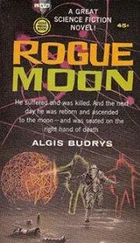Algis Budrys - Some Will Not Die
Здесь есть возможность читать онлайн «Algis Budrys - Some Will Not Die» весь текст электронной книги совершенно бесплатно (целиком полную версию без сокращений). В некоторых случаях можно слушать аудио, скачать через торрент в формате fb2 и присутствует краткое содержание. Год выпуска: 1961, Издательство: Regency Books, Жанр: Фантастика и фэнтези, на английском языке. Описание произведения, (предисловие) а так же отзывы посетителей доступны на портале библиотеки ЛибКат.
- Название:Some Will Not Die
- Автор:
- Издательство:Regency Books
- Жанр:
- Год:1961
- ISBN:нет данных
- Рейтинг книги:4 / 5. Голосов: 1
-
Избранное:Добавить в избранное
- Отзывы:
-
Ваша оценка:
- 80
- 1
- 2
- 3
- 4
- 5
Some Will Not Die: краткое содержание, описание и аннотация
Предлагаем к чтению аннотацию, описание, краткое содержание или предисловие (зависит от того, что написал сам автор книги «Some Will Not Die»). Если вы не нашли необходимую информацию о книге — напишите в комментариях, мы постараемся отыскать её.
Some Will Not Die — читать онлайн бесплатно полную книгу (весь текст) целиком
Ниже представлен текст книги, разбитый по страницам. Система сохранения места последней прочитанной страницы, позволяет с удобством читать онлайн бесплатно книгу «Some Will Not Die», без необходимости каждый раз заново искать на чём Вы остановились. Поставьте закладку, и сможете в любой момент перейти на страницу, на которой закончили чтение.
Интервал:
Закладка:
But that had not been much to go on. He had put the binoculars back—if someone had asked him, he would have replied that certainly he planned to come back to the apartment; he would not have stopped to think about it until he had actually heard his positive words—and he had left, climbing down flight after flight of stairs.
He was on his way to Larry Ruark’s apartment, he had realized at some point on his journey. Larry lived about fifty blocks uptown—by no means a difficult walk—and was a close friend from the time they had gone through the first two years of college together, before Larry had gone on to medical school. He had no way of knowing whether Larry had survived or not. But it seemed to him the chances were reasonably good. In part, they seem so to him because he was associating immunity with the word “doctor,” and because he needed to find a friend alive; an undergraduate medical student to whom he gave an inappropriate title because that made his friend likelier to have lived. But in part, he knew, his reasoning was sound. Larry had been young, and in excellent health; that was bound to have improved his chances.
Matthew Garvin had thought that surely he might find out more about the world, on his way to Larry’s. He had expected to meet other survivors, and talk to them.
He had expected that, between them, he and the other young, generally sound people could piece together an accurate idea of what the world’s condition was. There was nothing to fear from contact with each other, after all—either they had the plague, and would die, or had successfully resisted it, and would not. The time of the Carrier Panic—before it had been proven the disease agent, whatever it was, did not need to be transmitted from human hand to hand— that ugly time was over.
But he had begun to wonder whether the other survivors were aware of that. And he had begun to wonder whether some of them might not have become insane. For though he sometimes heard quick footsteps whose direction was disguised by echoes, he had been able to meet no one face-to-face, and when he had stood and shouted, no one answered. He knew he had come late to the inevitable sickness. He wondered what it was the more experienced survivors might have found out that would make them act like this.
Once he turned a corner and found someone who had survived the plague. It was a young man, canted awkwardly against a subway railing, dead, with fresh blood congealing around the stab wounds in his chest, and a torn grocery bag, empty, trampled at his feet.
The streets were badly blocked in places, and he had been moving more and more slowly, out of the same caution that made him hole up and lock himself in a truck cab overnight. So it was the next day when he saw the placards.
He was only a few blocks from Larry’s then. The placards were Civil Defense Emergency Posters, turned around to expose their unprinted backs. Hand-lettered on them now were the words “Live Medic,” and an arrow pointing uptown.
After that, Matthew Garvin hurried. He was sure Larry Ruark had survived, now. And the placards were the first trace of some kind of organization. He had begun to think of the world as a place much like a locked museum at night…except for a sporadic, distant hint of sounds that were too much like isolated gunshots. He had heard the sounds of police machineguns, during the Carrier Panic, and the deep thud of demolition as the Isolation Squads tried to cordon off the stricken areas—that had been quite early in the game—but this was different. This was like the sound of foot-snapped twigs in a forest infested by Indians.
The trail of placards led to Larry Ruark’s apartment house. The barricade in the doorway had been pulled aside, and the front door stood open.
It was the first open barricade he had seen since he had set out on his journey, though he had caught occasional glimpses of motion behind the windows of barricaded houses. He wondered if those inside had yet made their first ventures outside. It had begun to occur to him that perhaps they had—perhaps they had pulled down the barricades and then, after a day or so, put them back up. They were a defensive measure, of course—in the last days of the plague the sick, the drunk, and the stupid had roamed the streets wherever the diminishing police could not turn them back. Matthew Garvin himself had gone through a bout of hysteria in which he had laughed, over and over again, “Now there won’t be any war!” and the urge to go out—to get drunk, to smash something, to break loose and kick out at all the things society had erected in the expectation of war—the Shelter signs, the newspaper kiosks, the computer and television stores, the motion picture theaters—all the things that battened on desperation—that need to show that suddenly he, too, understood how miserably frightened they had all been under the shell of calm—all that had boiled and shaken inside him, and if he had been just a little bit different he, too, would have been roaring down the flamelit streets, and there would have been a need of barricades against him.
He moved tentatively up the steps to the foyer of Larry Ruark’s apartment house. The foyer and the stairs up were clean—swept, mopped, dusted. The brass handle on the front door had been polished. In the foyer stood another placard: “Live Medic Upstairs.”
There was nothing else to see, and there were no sounds.
He padded up the stairs, using only the balls of his feet to touch the treads. Yesterday he would not have done that. He did not entirely understand why he did it now. But it was appropriate to his environment, and he was young enough to be quite sensitive about conforming to the shape of the world around him.
Larry’s apartment was at the head of the stairs. The sign on the door said: “Medic—Knock and Come In.”
It was Larry! Matthew rapped his knuckles quickly on the paneling and pushed the door in the same motion. “Lar—”
The thin, hard arm went around his throat from behind. He realized that in another moment he was going to be pulled backward, off balance and helpless. He jumped upward, and that broke the hold enough for him to turn around, still inside the circle of the arm. He and Larry Ruark stared into each other’s eyes.
“Oh, my God!” Larry whispered. He lowered the hand with the butcher knife in it.
Matthew Garvin stood panting, still in his friend’s embrace. Then Larry let his other arm sag, and Matthew stepped back quickly.
“Matt…Jesus, Dear God, Matt!” Larry pushed back against the door and sagged on it, his eyes round. “I saw somebody coming, and I figured—and it turned out to be you!”
He was emaciated; his hair, always speckled with early gray, was wild and grizzled. His eyesockets were the color of dirty blue velvet. His clothes were stained and shapeless on his bones. Matt’s nostrils were still singed with the old, mildewed smell of them.
“Larry, what the hell is this?”
Larry rubbed his face, the butcher knife dangling askew between his fingers.
“Listen, Matt, I’m sorry. I didn’t know it was you.”
“Didn’t know it was me.”
“Oh, God damn it, I can’t talk. Sit down someplace, will you, Matt? I’ve—I need a minute.”
“All right,” Matt, said, but did not sit down. The room was furnished with an old leather couch, two shabby armchairs, and a coffee table on which sooty old magazines were laid out in a meticulous pattern. Very little light filtered through the cracks between the window drapes.
“Listen, Matt, is there any food in that knapsack?”
“Some. You hungry?”
“Yes. No—Anyway, that can wait. I just almost killed you—is this a time to talk about food? We’ve got to work this out—you’ve got to—look, do you know I can see the George Washington Bridge from my bedroom window?”
Читать дальшеИнтервал:
Закладка:
Похожие книги на «Some Will Not Die»
Представляем Вашему вниманию похожие книги на «Some Will Not Die» списком для выбора. Мы отобрали схожую по названию и смыслу литературу в надежде предоставить читателям больше вариантов отыскать новые, интересные, ещё непрочитанные произведения.
Обсуждение, отзывы о книге «Some Will Not Die» и просто собственные мнения читателей. Оставьте ваши комментарии, напишите, что Вы думаете о произведении, его смысле или главных героях. Укажите что конкретно понравилось, а что нет, и почему Вы так считаете.
